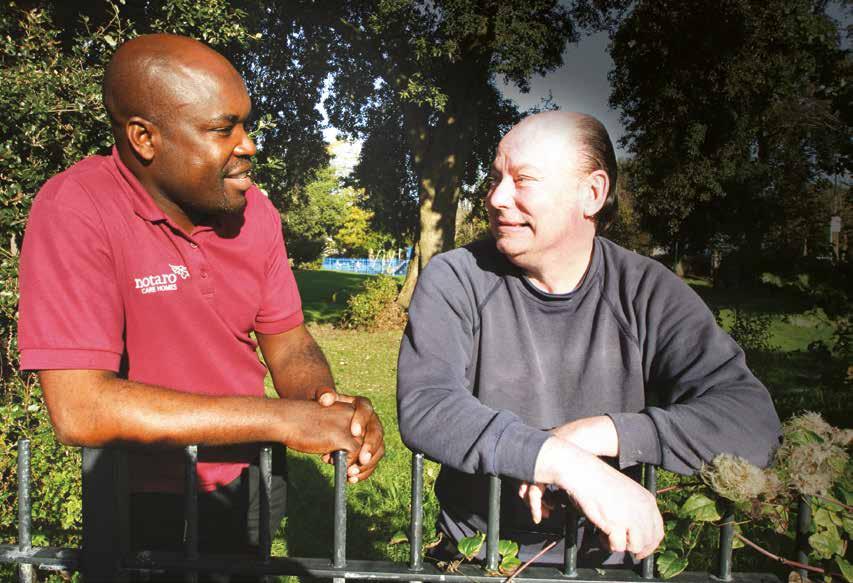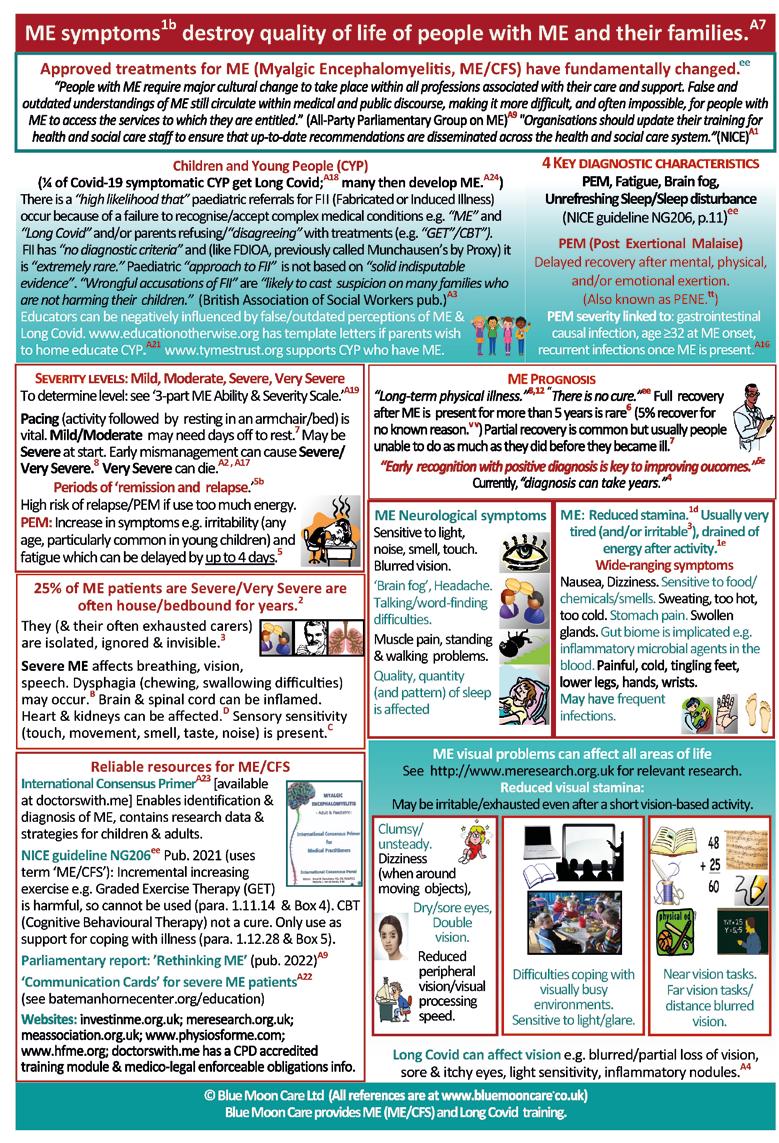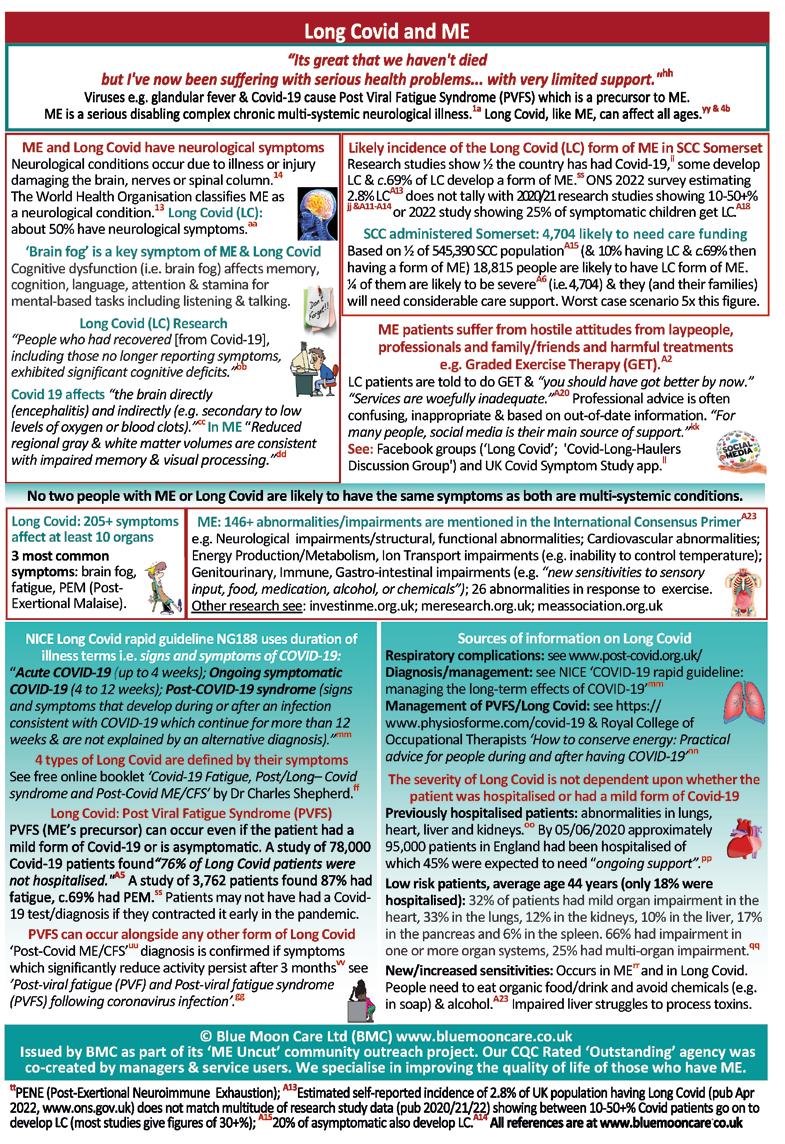
8 minute read
Care homes
Sometimes, people decide to move to a care home when they are in a crisis and cannot work out how to get the help they need to stay at home.
Often, people who are helped through the crisis can keep living at home with the right support. Before considering moving into a care home, make sure that all other options that could help you to remain living independently have been exhausted. For example, by visiting a Community Connect centre or asking to talk with someone from Adult Social Care – see page 5.
Types of home
Residential care homes (care homes without nursing)
These provide personal care, such as washing, dressing, bathing and assistance with toilet needs, if required. They do not offer nursing care. In some homes, staff may only be ‘on call’ and not ‘on duty’ at night. Some provide specialist care for people with mental health support needs, physical disabilities, learning disabilities or autism.
If your needs require a qualified nurse, this care will be provided by the district nursing service.
Specialised Residential Care homes (SRC)
These are residential care homes that specialise in supporting people who are living with advanced dementia but who do not have nursing needs. They are a specific type of home only available in Somerset. What makes them different is that they are provided through a joint venture between the local authority and Somerset Partnership NHS and Social Care Trust through specific contracts.
The Trust employs Specialist Care Development Nurses (SCDNs) who support residents in these specialised care homes and provide advice and support to the care staff. SCDNs are involved in discussing the needs of possible new residents and ensuring that they meet the criteria for SRC. You will need a social care assessment to determine eligibility for SRC.
SRCs are marked with an SRC throughout the care home and care home with nursing listings in this Directory, beginning on page 71.
Care homes with nursing
These provide nursing care 24 hours a day. Usually, people living in these homes will be very mentally and/or physically frail or immobile and have healthcare needs that can only be met by a registered nurse.
Some offer general nursing care for older people, while others specialise in mental health or physical disability.
Care homes with nursing are often dual registered to provide both ‘residential’ and ‘nursing’ care. If you choose one of these homes, you won’t need to move if your condition changes. Also, this type of home helps couples who may have different needs to live together in the same home.
Listings of care homes and care homes with nursing begin on page 71 of this Directory. Each listing details what categories of care the home provides.
Search for care in your area
www.carechoices.co.uk
With so many providers to choose from, where do you start?
• Find care providers quickly and easily • Search by location and care need • Information on care quality • Links to inspection reports • Additional information, photos and web links • Brochure requests
Notaro ARBD Care has over 30 years experience of providing individualised support for people living with Korsakoff’s Syndrome or other alcohol related brain damage from across the UK.
Following our successful 3-step enablement programme, our goal is to assist the person back into community living having regained basic living skills, dignity and structure. For those with a more severe diagnosis, we do provide a home for life. Fees are reduced as the person steps through the programme. We have been working with local authorities across the UK, providing what most see, as the missing piece to aiding a successful recovery. If you would like to request a brochure or to arrange a free assessment, please contact:
Our South West specialist care homes are: • Serenita Care Home, Weston-super-Mare • Campania Care Home, Weston-super-Mare • Vane Hill Care Home, Torquay
01934 422822
or email: enquiry@arbdcare.co.uk www.arbdcare.co.uk
I had been in and out of rehab and hospitals many times, and nothing worked until coming to Serenita. I have been able to get better by on-going support, personal development and guidance. I feel very comfortable here and am looking forward to walking out one day, not running. Martin, ARBD Resident

set of standards. Health and social care services must be registered to show that they meet a
The Care Quality Commission (CQC) is the independent regulator of health and social care in England. It registers care providers and inspects and rates services. When things go wrong, the CQC can also take action to protect people who use services.
After an inspection of a care home or home care agency, the CQC publishes a report of what it found. The report looks at how well the service meets the CQC’s five key questions: Is the service safe? Effective? Caring? Responsive to people’s needs? Well led?
Each care home and home care agency will get an overall rating of outstanding, good, requires improvement or inadequate. It will also get ratings for each key question. The ratings mean you can easily see where a service is performing well, and where it needs to improve.
It’s always a good idea to check inspection reports and ratings when choosing a care service. You can find reports and ratings on the CQC’s website at:
www.cqc.org.uk
Care providers must also display their latest rating at their premises and on their website.
You can also tell the CQC about your experiences of care – good or bad. It can use your information to see where it should inspect next, and what to look out for when it does. If you want to share your experience of care, visit: www.cqc.org.uk/share
Tel: 03000 616161 Email: enquiries@cqc.org.uk Web: www.cqc.org.uk Write to: The Care Quality Commission, Citygate, Gallowgate, Newcastle upon Tyne NE1 4PA
Care home contracts – independent advice
We suggest you consult a solicitor before signing any contract, to make sure that the terms are fair, and you understand your rights and obligations.
We recommend that you take independent financial advice from an organisation like Age UK or Citizens Advice. The Law Society has lists of solicitors who specialise in advice for older people. Visit: www.lawsociety.org.uk to get help with finding a solicitor near you who specialises in advice about care.
Choosing a care home
Comprehensive lists of care homes and care homes with nursing begin on page 71 of this Directory. If you are thinking of moving into a care home and need help from social care, please see page 46.
Things you need to think about
Every home should produce a brochure or service users’ guide to tell people about the service it provides, and the facilities offered to its residents.
Choosing the right care home is important. If you can, visit more than one home before you make up your mind. You may be able to spend the day there, have a meal, talk to people who live in the home and meet some of the staff. This will help you make up your mind. You may be able to have a trial stay before you finally decide.
You should ask to see the Care Quality Commission report and rating before you visit and think about the things that are important to you and what questions you want to ask. When you visit a home, take the care homes checklist on page 43 with you.

Home 1 Home 2 Home 3
Fees per week Quality rating* £ £ £
We suggest that you take paper with you when visiting care homes so that you can make notes. You can download and print this checklist at: www.carechoices.co.uk/checklists
Staff
What is the minimum number of staff that are available at any time? Are staff respectful, friendly and polite? Do staff have formal training? Are the staff engaging with residents?
Activities
Can you get involved in activities you enjoy? Is there an activities co-ordinator?
Does the home organise any outings? Are residents escorted to appointments? Do the residents seem entertained?
Does the home have a varied activities schedule?
Life in the home
Is the home adapted to suit your needs? Can you bring your own furniture? Are there enough plug sockets in the rooms?
Are there restrictions on going out? Is there public transport nearby? Does the home provide any transport? Can you make/receive calls privately? Can you decide when to get up and go to bed? Does the home allow pets? Does the home use Digital Care Planning accessible to families? Personal preferences
Is the home too hot/cold? Can you control the heating in your room? Is the décor to your taste? Are there restricted visiting hours? Is there somewhere you can go to be alone?
Does the home feel welcoming?
Catering
Can the home cater for any dietary requirements you may have? Does the menu change regularly? Can you eat when you like, even at night? Can you have food in your room? Is there a choice of food at mealtimes?
Is alcohol available/allowed if you want it?
Can visitors join you for meals?
Fees
Do your fees cover all of the services and activities?
Are fees likely to change regularly? Is the notice period for cancellation of the contract reasonable?
Could you have a trial period? Can you keep your room if you go into hospital? Can you handle your own money?










